| MIAMI,
Oct. 19, 2006 – Navy Adm. James G. Stavridis became the
first naval officer at the helm of U.S. Southern Command
this morning. Before assuming command, he said he’s
looking forward to the challenges and opportunities in
this varied region and to strengthening relationships
throughout Latin America.
Stavridis received his
fourth star yesterday evening and assumed command from
Army Gen. Bantz J. Craddock in a ceremony here today.
Craddock is moving to Europe to assume the lead of U.S.
European Command and of NATO military forces.
In a broad-ranging interview earlier this week with local
media members and American Forces Press Service, Stavridis
discussed his thoughts on issues facing the region and
described some of his previous experiences there.
"Latin America is part of our DNA, and we are part of
theirs," he said. "It's all one Americas."
Stavridis’ new command encompasses a vast and varied
region of 450 million people in 32 countries and 13
territories and protectorates. "It's a sixth of the
surface area of the world," he said.
Despite pressing demands on the U.S. military in other
parts of the world, U.S. Southern Command is a vital piece
of American security policy for several reasons, Stavridis
explained. "There's a plethora of reasons that
SOUTHCOM is an important functional part of what we're
doing in the Department of Defense," he said.
He noted that 40 million Americans speak Spanish, and that
immigrants come to the United States from the region every
day. "So there's an enormous cultural and demographic
linkage," he said.
Security concerns in the United States’ backyard could
spill over into the country. "We have to always be
mindful of security concerns that are close at hand to us.
So if there are problems like poverty, and gangs, and
narcotrafficking, money laundering, human smuggling, these
are things that will impact the United States,"
Stavridis said. "And so therefore, when it's
proximate to us and in our region that's close at hand,
it's important that we work with our partners to try to
reduce those threats, not only in their countries but in
ours, because inevitably the effects can be felt in the
United States."
Finally, the admiral said, operations in SOUTHCOM are
vital to the war on terrorism. "It is always a
possibility that, as terrorists seek to harm the United
States, they could possibly try and come through the
SOUTHCOM area of responsibility," he said. "We
see indications of activity from a variety of different
organizations that have interests antithetical to the
United States in this region.
"So we have to be very mindful of that and,
therefore, participate … with our regional partners to
try and defend the United States from a security
perspective in this war on terror," he added.
Stavridis had a golden opportunity earlier this month to
begin getting to know ministers and chiefs of defense in
the region when he attended a Defense Ministerial of the
Americas meeting in Managua, Nicaragua. "I had a nice
oportunidad de practicar mi Español en Nicaragua,"
he said. "And it was all very, very positive and
helpful."
The admiral said he is fluent in French, has been working
hard on Spanish and plans to tackle Portuguese once he’s
fluent in Spanish. Brazilians speak Portuguese. "One
hundred eighty million people in this area speak
Portuguese," he said. "We often don't sort of
recognize that. … So it's important to reach out to that
particular partner … as well as to make an effort with
their language. I think language is very important."
Stavridis said he plans to visit the U.S. enemy combatant
detention center at Guantanamo Bay, Cuba, which he called
"an important part of my responsibilities."
"I want to look the commander there in the eye, Rear
Adm. Harry Harris, who is a friend of mine. I've known
Admiral Harris for a long time. He enjoys my
confidence," Stavridis said. "I want to meet
with him personally, get his impressions of how things are
going, and I want to emphasize to him that we will
continue to run Guantanamo Bay in a legal and transparent
fashion."
The new commander will find Guantanamo much changed since
he first visited the naval base there as a young naval
officer in 1973. At the time, Stavridis served as a boat
captain who shuttled sailors back and forth to the base
from the USS Nimitz, anchored off shore because of
Guantanamo Bay’s shallow depth.
Stavridis said he believes the detention facility at
Guantanamo Bay is a "well-run, legal, transparent
facility … run under the auspices of United States
law." But, he added, he will visit the base to draw
his own conclusions.
Stavridis has a wealth of unique experiences that will
serve him well as the chief of U.S. Southern Command. The
regional studies portion of his doctorate in international
relations focused on Latin America, and he’s plied these
waters as a sailor for many years.
"Throughout my naval career, I've had the opportunity
to sail through these waters: the Caribbean, I've been
through the Panama Canal multiple times, in and out of
Guantanamo multiple times," he said. "I've
operated at one time or another with, I would venture to
say, all the seagoing navies in the region."
Stavridis also commanded the Enterprise Carrier Strike
Group, which for a time included an Argentine destroyer,
the Sarandi. "The Argentine navy placed her in our
strike group, and we trained together and worked up
together and she deployed with us to the Mediterranean Sea
in 2003."
The admiral has recently traveled extensively through the
region in his capacity as senior military assistant to
Defense Secretary Donald H. Rumsfeld, who will officiate
at today’s change-of-command ceremony.
Stavridis said he is most looking forward to engaging with
partners and increasing regional security. "This is
an area of the world where it's extremely unlikely that
we're going to be launching missiles or dropping
bombs," he said. "This is an area of the world
where our engagement is in ideas and conferences and
working together -- creating a global security environment
that we can all be part of and draw benefit from.
"And so that opportunity to engage with all these
different partners in this rich, diversity and complexity
in this region is just fascinating to me, and I look
forward to it."
For Defense Secretary
Donald Rumsfeld's remarks at the Southern Command change
of command ceremony GO
TO
|
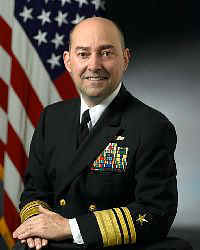
SOUTHCOM'S NEW COMMANDER Admiral
James G. Stavridis October
19, 2006
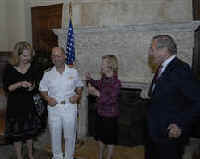
Admiral Stavridis'
wife, Laura, and his mother, Shirley, pin on his fourth
star Oct. 18 in Miami with Secretary of Defense Donald
Rumsfeld at right [Southcom photo]
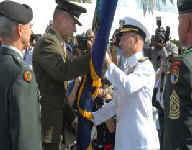
General Peter Pace
(center left), JCS Chairman, transfers SouthCom flag to
Admiral James Stavridis after 17-gun salute in ceremony in
Miami October 19, 2006. Pace was Commander of SouthCom
2000 - 2001. [SouthCom photo]
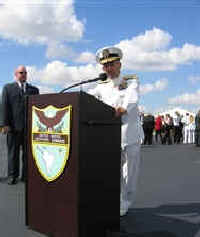
New SouthCom Commander
Adm Stavridis speaks to more than 300 invited guests and
military, including Marine General Peter Pace, JCS
Chairman, and Secretary of Defense Donald Rumsfeld at
change of command ceremony October 19 [DOD photo by
Kathleen Rhem, AFPS]
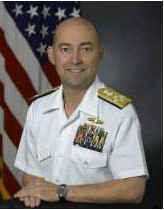
Admiral
Stavridis' biography
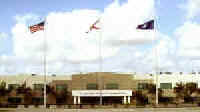
U.S. Southern Command
in Miami, Florida since September 1997 [SouthCom
photo]
|